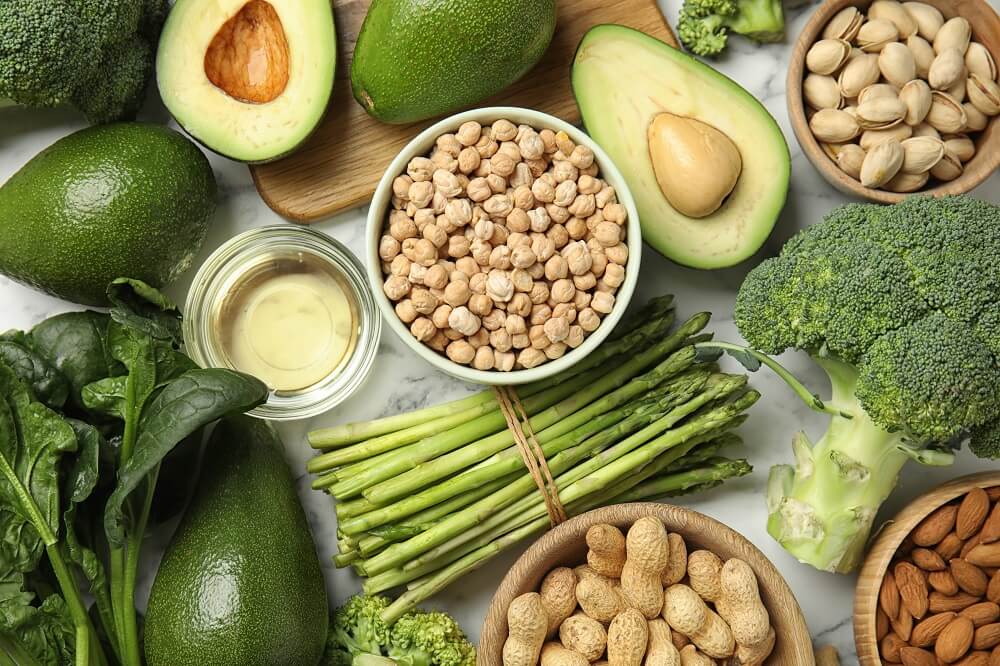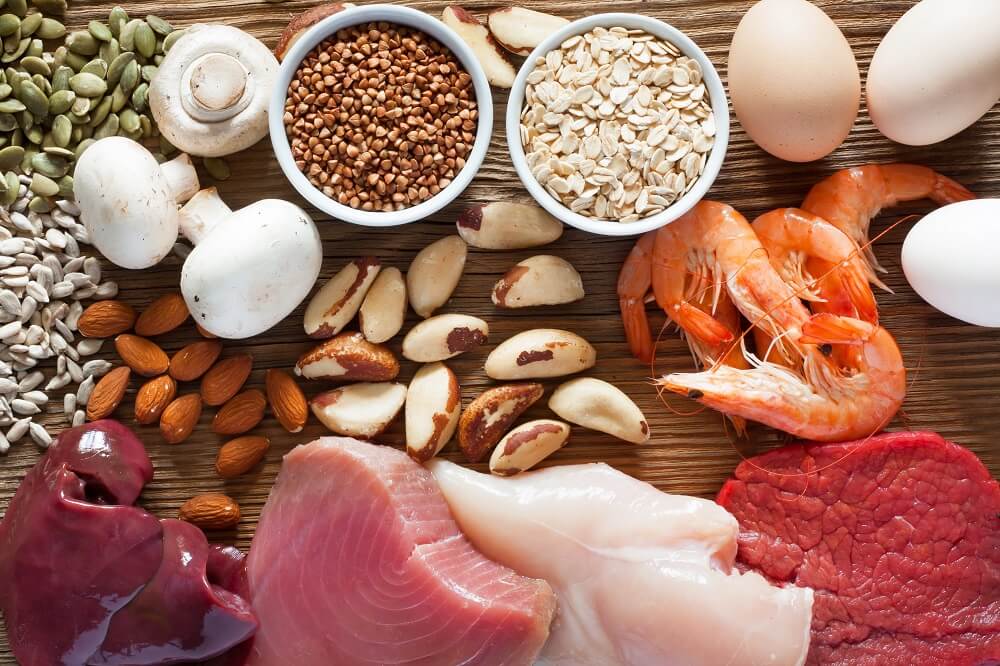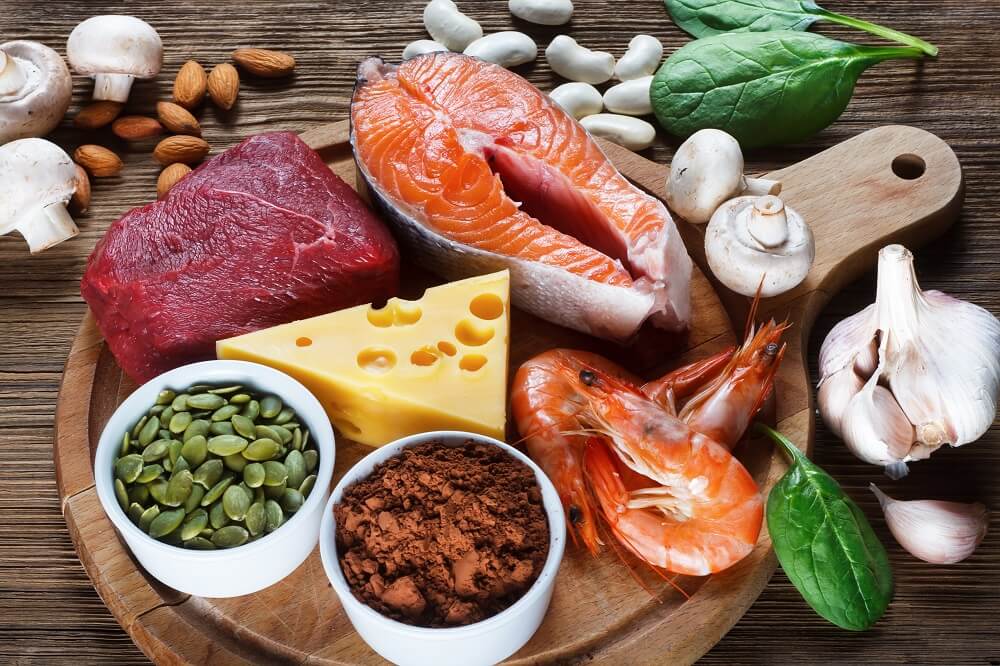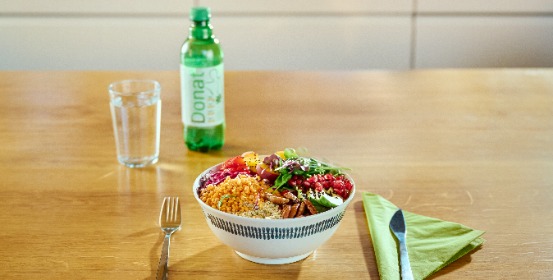Vitamin E is another fat-soluble vitamin that plays an important role in maintaining health and vitality. One of its basic tasks is antioxidant activity. Also, it has been proven that vitamin E protects cells from oxidative stress, which has also been confirmed by the European Food Safety Authority (EFSA). Vitamin E, therefore, protects cells from the unwanted effects of free radicals – those produced in the body, as well as those coming from the outside (in air, tobacco smoke, and food). Vitamin E “captures” free radicals and transforms them into a harmless form. Thus, vitamin E helps maintain healthy skin, blood vessels, the reproductive system, the neurological system, and plays an important role in stimulating the immune system. It stimulates the formation of antibodies and protects white blood cells from damage.
In addition to its antioxidant effect, vitamin E also takes care of some other vitamins. It helps the body make better use of vitamin K and is necessary for the successful use of vitamin A. Vitamin C helps in the regeneration of vitamin E after its fight with free radicals.
Who needs more vitamin E to prevent its deficiency?
Vitamin E supplementation is necessary for diseases associated with reduced absorption of fats and thus reduced absorption of vitamin E (liver diseases, pancreatic diseases, biliary diseases, coeliac disease, cystic fibrosis, Crohn’s disease). Premature infants also require vitamin E because it is crucial for their proper development. In the case of genetic diseases, the ability to absorb vitamin E is significantly reduced.
How much vitamin E do we need?
According to the recommendations of the Food and Nutrition Board of the US National Academies of Sciences, the recommended dietary allowance of vitamin E is 15 mg, whereas nursing mothers require 19 mg per day. According to the Regulation on Food Supplements in force in the Republic of Croatia, the recommended daily allowance (RDA) of vitamin E is 12 mg, whereas the maximum daily intake is 100 mg per day.
Where can we find vitamin E?
Dietary vitamin E gives the best results in the body since food components generally work in synergy, i.e. they complement each other.
| FOOD | VITAMIN E (MG/100 G) | % RDA ACCORDING TO THE CROATIAN REGULATION (12 MG) |
|---|---|---|
| Almonds | 25.63 | 214% |
| Sunflower seeds | 26 | 217% |
| Avocado | 2.07 | 17% |
| Olives | 3,.81 | 32% |
| Wheat germ | 16 | 133% |
| Olive oil | 14.35 | 120% |
| Kiwi | 1.46 | 12% |
| Broccoli, cooked | 2.52 | 21% |
| Spinach, cooked | 2.08 | 17% |
| Sunflower oil | 41 | 342% |
If vitamin E is consumed solely through food, there is no danger of an overdose. However, if we overdo it with vitamin E supplements, we may experience its toxic effects such as diarrhea, blurred vision, stomach cramps, muscle weakness, headache, and other symptoms. If you think you need a vitamin E supplement, consult your doctor.

SELENIUM – A VERY PRECIOUS TRACE MINERAL
Selenium is a trace mineral that is naturally present in many foods and is very important for human health. It is a component of the so-called selenoproteins, which play a key role in reproduction, thyroid hormone metabolism, DNA synthesis, and protection against oxidative damage and infections. We need selenium in small amounts, but it is very important for many bodily functions.
What is the role of selenium in the body?
The official European Commission document containing authorized health claims for selenium lists six proven claims and authorized effects on the body:
- contributes to the normal functioning of the thyroid gland,
- contributes to the normal functioning of the immune system,
- contributes to the maintenance of healthy hair,
- contributes to maintaining healthy nails,
- contributes to normal spermatogenesis,
- contributes to the protection of cells against oxidative stress.
How does selenium contribute to the normal functioning of the immune system?
Research shows that selenium deficiency weakens the immune system. Selenium plays an important role in the production of cytokines, i.e. molecules that regulate the immune response. If there is insufficient selenium in the body, oxidative stress increases, which has a negative effect on the body.
How much selenium do we need?
According to the recommendations of the Food and Nutrition Board of the US National Academies of Sciences, the recommended dietary allowance of selenium for healthy adults is 55 mcg, for pregnant women 60 mcg, whereas nursing mothers require 70 mcg per day. According to the Regulation on Food Supplements in force in the Republic of Croatia, the recommended daily allowance (RDA) of selenium is 55 mcg, whereas the maximum daily intake is 100 mcg per day.
| FOOD | SELENIUM (MCG/100 G) | % RDA ACCORDING TO THE CROATIAN REGULATION (55 MCG) |
|---|---|---|
| Brazil nuts | 1917 | 3485% |
| Tuna, canned | 76 | 138% |
| Chicken breast | 25.1 | 46% |
| Salmon, canned | 33.9 | 62% |
| Fried egg | 32.4 | 59% |
| Skimmed milk quark | 11.9 | 22% |
| Sunflower seeds | 79.3 | 144% |
| Rice flakes | 18 | 33% |
| Scampi | 42.7 | 78% |
| Chicken liver, roasted | 64.5 | 11% |
It should be taken into account that the amount of selenium in different plants varies greatly and depends on the soil in which the plant grows. If there is not much selenium in the soil, the selenium content of the plant will also be low.
Is it possible to overdo it with the intake of selenium?
Selenium may be toxic in large doses. This applies not only to dietary supplements but also to natural sources of selenium. The biggest source of selenium is Brazil nuts, which are recommended not to be eaten too often and to be consumed in smaller quantities. Just one Brazil nut (about 5 g) contains 95.8 mcg of selenium, which is 174% of the recommended daily allowance.
In order to maintain the balance of nutrients in the body, it is essential to consume enough selenium, but not too much. Excessive amounts can affect other minerals such as zinc and iron by reducing their absorption and concentration in the blood.

ZINC – THE IMMUNE SYSTEM’S STRONG ALLY
Zinc is a mineral that is absolutely necessary for good health. It is vital for the functioning of over three hundred enzymes and is involved in many important processes in the body. It metabolizes nutrients, maintains the immune system, and “restores” body tissues. Zinc is not stored in the body, so it must be consumed with food every day.
What is the role of selenium in the body?
The official European Commission document containing authorized health claims for zinc lists eighteen proven claims and authorized effects on the body:
- contributes to normal cognitive functions,
- contributes to the normal metabolism of fatty acids,
- contributes to the normal metabolism of vitamin A,
- contributes to maintaining healthy bones,
- contributes to the maintenance of healthy hair,
- contributes to maintaining healthy skin,
- contributes to maintaining healthy nails,
- contributes to maintaining normal vision,
- contributes to normal fertility and reproduction,
- contributes to maintaining a normal level of testosterone in the blood,
- contributes to the protection of cells against oxidative stress,
- contributes to normal acid-base balance,
- contributes to normal DNA synthesis,
- participates in the process of cell division,
- contributes to normal protein synthesis,
- contributes to the normal synthesis of macronutrients,
- contributes to the normal synthesis of carbohydrates,
- contributes to the normal functioning of the immune system.
The influence on the normal functioning of the immune system is one of the key roles of zinc. It stimulates the production and activity of T-lymphocytes, i.e. white blood cells that fight infection. Thus, zinc deficiency can reduce the effectiveness of the immune system. Even a small zinc deficiency can lead to more frequent infections and a “drop” in immunity.
How much zinc do we need?
According to the recommendations of the Food and Nutrition Board of the US National Academies of Sciences, the recommended dietary allowance of zinc for healthy adult males is 11 mg, for women 8 mg, and pregnant women 11 mg, whereas nursing mothers require 12 mg per day. According to the Regulation on Food Supplements in force in the Republic of Croatia, the recommended daily allowance (RDA) of zinc is 10 mg, whereas the maximum daily intake is 15 mg per day.
Where is zinc found?
Zinc is found in many foods but in different amounts. The best source of zinc is seafood, but it is poorly represented in the diet. Most of the dietary zinc is consumed from meat. There are also very good plant sources of zinc, such as whole grains and legumes, but due to their phytates and fiber content, which inhibit zinc absorption in the body, these are seen as problematic. The yield of zinc is much better in foods of animal origin.
| FOOD | ZINC (MG/100 G) | % RDA ACCORDING TO THE CROATIAN REGULATION (10 MG) |
|---|---|---|
| Oyster | 46.88 | 469% |
| Veal liver | 12 | 120% |
| Beef liver | 5.19 | 52 |
| Pumpkin seeds | 7.64 | 76% |
| Sunflower seeds | 5.23 | 52% |
| Ground beef | 4.8 | 48% |
| Cheddar cheese | 3.64 | 36% |
| Dark chocolate | 1.8 | 18% |
| Fried eggs | 1.36 | 13.6% |
| Chicken breast, baked | 1.53 | 15,6% |
Is it possible to overdo it with the intake of zinc?
With a balanced diet, we consume between 9 and 15 mg of zinc, so it is impossible to overdose on zinc from natural sources. However, when overdoing it with dietary supplements and consuming too much zinc, stomach irritation and vomiting may occur. According to the recommendations of the Food and Nutrition Board of the US National Academies of Sciences, the maximum daily intake of zinc, which does not have unwanted side effects, is 40 mg.

Choose chapter:





